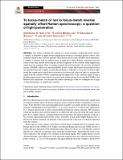Files in this item
To focus-match or not to focus-match inverse spatially offset Raman spectroscopy : a question of light penetration
Item metadata
| dc.contributor.author | Shillito, Georgina E. | |
| dc.contributor.author | McMillan, Lewis | |
| dc.contributor.author | Bruce, Graham D. | |
| dc.contributor.author | Dholakia, Kishan | |
| dc.date.accessioned | 2022-03-04T17:30:02Z | |
| dc.date.available | 2022-03-04T17:30:02Z | |
| dc.date.issued | 2022-03-14 | |
| dc.identifier | 277816032 | |
| dc.identifier | 975914fb-f060-45d5-9f5a-b839fb600b80 | |
| dc.identifier | 85125871305 | |
| dc.identifier | 000768611900055 | |
| dc.identifier.citation | Shillito , G E , McMillan , L , Bruce , G D & Dholakia , K 2022 , ' To focus-match or not to focus-match inverse spatially offset Raman spectroscopy : a question of light penetration ' , Optics Express , vol. 30 , no. 6 , pp. 8876-8888 . https://doi.org/10.1364/OE.451496 | en |
| dc.identifier.issn | 1094-4087 | |
| dc.identifier.other | ArXiv: http://arxiv.org/abs/2112.08877v1 | |
| dc.identifier.other | ORCID: /0000-0003-3403-0614/work/109316083 | |
| dc.identifier.other | ORCID: /0000-0002-7725-5162/work/109316246 | |
| dc.identifier.uri | https://hdl.handle.net/10023/24994 | |
| dc.description | Funding: The work was supported by funding from the UK Engineering and Physical Sciences Research Council (EP/P030017/1 and EP/R004854/1) and the H2020 FETOPEN project “Dynamic” (EC-GA 863203). | en |
| dc.description.abstract | The ability to identify the contents of a sealed container, without the need to extract a sample, is desirable in applications ranging from forensics to product quality control. One technique suited to this is inverse spatially offset Raman spectroscopy (ISORS) which illuminates a sample of interest with an annular beam of light and collects Raman scattering from the centre of the ring, thereby retrieving the chemical signature of the contents while suppressing signal from the container. Here we explore in detail the relative benefits of a recently developed variant of ISORS, called focus-matched ISORS. In this variant, the Fourier relationship between the annular beam and a tightly focused Bessel beam is exploited to focus the excitation light inside the sample and to match the focal point of excitation and collection optics to increase the signal from the contents without out compromising the suppression of the container signal. Using a flexible experimental setup which can realise both traditional and focus-matched ISORS, and Monte-Carlo simulations, we elucidate the relative advantages of the two techniques for a range of optical properties of sample and container. | |
| dc.format.extent | 13 | |
| dc.format.extent | 3079760 | |
| dc.language.iso | eng | |
| dc.relation.ispartof | Optics Express | en |
| dc.subject | QC Physics | en |
| dc.subject | DAS | en |
| dc.subject.lcc | QC | en |
| dc.title | To focus-match or not to focus-match inverse spatially offset Raman spectroscopy : a question of light penetration | en |
| dc.type | Journal article | en |
| dc.contributor.sponsor | NERC | en |
| dc.contributor.sponsor | EPSRC | en |
| dc.contributor.sponsor | EPSRC | en |
| dc.contributor.sponsor | European Commission | en |
| dc.contributor.institution | University of St Andrews. School of Physics and Astronomy | en |
| dc.contributor.institution | University of St Andrews. Centre for Biophotonics | en |
| dc.contributor.institution | University of St Andrews. Sir James Mackenzie Institute for Early Diagnosis | en |
| dc.contributor.institution | University of St Andrews. Biomedical Sciences Research Complex | en |
| dc.identifier.doi | https://doi.org/10.1364/OE.451496 | |
| dc.description.status | Peer reviewed | en |
| dc.identifier.grantnumber | NEH002227/1 | en |
| dc.identifier.grantnumber | EP/P030017/1 | en |
| dc.identifier.grantnumber | EP/R004854/1 | en |
| dc.identifier.grantnumber | 863203 | en |
This item appears in the following Collection(s)
Items in the St Andrews Research Repository are protected by copyright, with all rights reserved, unless otherwise indicated.

